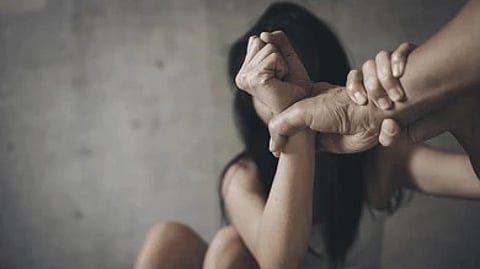
- NEWS
- the EDIT
- COMMENTARY
- BUSINESS
- LIFE
- SHOW
- ACTION
- GLOBAL GOALS
- SNAPS
- DYARYO TIRADA
- MORE

A total of 8,055 cases of violence against women and children (VAWC) were logged in 2023, according to the Philippine Commission on Women (PCW).
Citing the Philippine National Police, the PCW said 2,791 cases were filed under the Anti-Rape Law, 473 cases under the Safe Spaces Act, 59 cases under the Anti-Sexual Harassment Act, and 207 cases under the Expanded Anti-Trafficking in Persons Act.
This totaled 11,585 cases in just one year; however, the PCW said this does not include unreported or unrecorded cases.
“These staggering numbers are not just figures. They represent real Filipino women and girls—our grandmothers, mothers, aunts, wives, sisters, daughters, nieces, granddaughters, or even ourselves—who have been abused, discriminated against, unjustly labelled as the ‘weaker sex,’ and have endured violence despite efforts to combat this human rights violation,” the PCW said during the launch of the 18-day Campaign to End Violence Against Women on Monday.
On average, 63 percent of countries have legislation on intimate partner violence, 37 percent have laws on rape based on lack of consent, 84 percent have legislation criminalizing marital rape, 92 percent have legislation that addresses sexual harassment, and 83 percent have budgetary commitments to address VAW.
All of these countries include the Philippines, but why does VAW prevail?
“Despite years of collective efforts of stakeholders from both public and private sectors rallying behind the cause and the annual show of support that reflect our nation’s desire to achieve a VAW-free Philippines (#VAWfreePH), the painful truth remains: Filipino women are still labelled as the ‘weaker sex’ simply because they are not men,” the PCW lamented.
“They continue to endure abuse and violence even within their intimate partner relationships. Gender-based discrimination and injustice and gender inequality persist, casting a shadow over the legacy of empowered Filipino women, such as the pre-colonial babaylans and catalonans, who once held significant leadership and societal roles,” it pointed out.
Staggering numbers of VAW cases speak louder than ever
Thus, the PCW stressed that this is high time to “turn our whys into hows.” VAW questions should now trigger a deeper reflection, demanding urgent action such as “how many VAW cases go unreported, unnoticed, or unaddressed?” “How many victims continue to suffer in silence and endure violence because they cannot seek help?” or “How certain are we that, without the support they desperately need, these victims will not become perpetrators as well?”
“To achieve a VAW-free Philippines, we must begin with nothing but the truth. Long-term issues, no matter how common, must be acknowledged, not denied,” the PCW said.
“Challenges, no matter how difficult, must be faced head-on. While we have made strides, we must keep finding our way forward until VAW is no longer a lived reality for Filipino women,” it added.
The PCW said it hopes that this year’s observance of the 18-Day Campaign to End VAW “be a turning point.”
“Let us strive to make this advocacy something that we believe in with every fiber of our being, resonating with our core values as a nation, and recognizing VAW as an enemy of the Filipino people,” the agency continued.
“Let us work hand in hand to eradicate and prevent this pervasive violence that ruins lives, destroys homes, tarnishes relationships, breaks communities, cripples economies, and steals the future of countless women and girls.”
